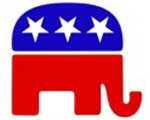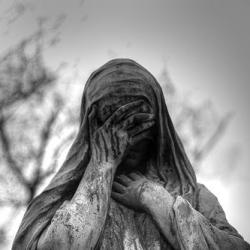By Justin Hart
 As Peter Jennings was tallying up the electoral votes for George H.W. Bush (41) during the 1988 presidential election, I can recall feeling a bit slighted as a Mormon. Said Jennings: "Utah, with its three electoral votes, has voted Republican for as long as anyone can remember." I was only 16 years old at that time, but I recall a certain grit and assumption in Jennings' tone that led me to think... is it really a given that Mormons vote Republican?
As Peter Jennings was tallying up the electoral votes for George H.W. Bush (41) during the 1988 presidential election, I can recall feeling a bit slighted as a Mormon. Said Jennings: "Utah, with its three electoral votes, has voted Republican for as long as anyone can remember." I was only 16 years old at that time, but I recall a certain grit and assumption in Jennings' tone that led me to think... is it really a given that Mormons vote Republican?
History has borne out Jennings' remark and for good reason. Republicans, or more broadly, conservatives, share many of the same values as Mormons. Both groups tout solid family values, limited government intervention, and entrepreneurial thinking. Mormons will likely lean Republican for the foreseeable future. I'd like to think this fact keeps the Left up at night, but I doubt it.
Senator Reid, Mormon Anomaly
Let me shed some light this strange anomaly: the highest-ranking Mormon ever in Congress is a liberal Democrat.
There is a certain bewilderment among conservative Mormons. Occasionally, the subject will come up and someone questions aloud: "Is he really a member?"
This may seem absurd on the face of it. After all, no one fainted at the notion of Senator Kennedy being a Catholic. But in terms of odds, you have to swing a lot of dead cats around before you hit a liberal Mormon. It is, frankly, an anomaly.
However, there is no ecclesiastical litmus test for holding specific political beliefs. Even if those beliefs were seemingly at odds with Mormon doctrine, this alone would not be cause for excommunication. On the other hand, if those contrary views are publicized by the individual in order to harm or lead other Mormons away from the LDS Church, then excommunication would certainly be on the table.
Still, Harry Reid is in a difficult and unenviable position, belonging to a party that does espouse views that are contrary to Church Teachings (e.g., homosexual marriage). "Difficult" because he is a leader in that party and a very public figure; "unenviable" because most U.S. Mormons lean the other way politically.
The Mormon Church does not pick party sides in this fight. In fact, the Church works very hard to remain politically neutral. Yes, there have been a few notable Mormons who are both liberals and Democrats, but in the end, they are mostly exceptions to the rule.
Mormons, Inc.
Beyond politics, most of the prominent Mormon names people recognize are not in politics but in "Big Business."
Most notably there is the Marriott Corporation: J. W. Marriott, the late founder of the hotel chain who started his empire selling R&W Root Beer on the Mall in the early 1940s. Next on the list: Stephen R. Covey, author of the bestselling book Seven Habits of Highly Effective People and CEO of Franklin Covey, Inc. Top executives at Dell, AOL, Novell, Black & Decker, Jet Blue, the list goes on. During the heyday of the ‘90s investment watch there was even a Mormon Stock Index. You could also include the sports and entertainment careers of Steve Young, Danny Ainge, and the Osmonds. Of course, there's also Mitt Romney.
Mitt Romney
When consulting maven Mitt Romney took over the reins of the financially failing Salt Lake City Olympics, he was invited to meet the entire Olympic committee. The meeting was scheduled for the only five-star hotel in Utah with a lunch layout that would make Caesar jealous. Mitt canceled the venue and moved it to the Olympic offices they were already paying for. He ordered pizza and charged a dollar per slice. In the end, the Olympics made a $100 million profit. Now that's a conservative.
Considered one of the best businessmen in America, Romney's 1994 senatorial campaign came within striking distance of Ted Kennedy and he later won the Governorship of Massachusetts. Romney recently failed in his bid to get the Republican nomination for President but established a political base of support that will not be overlooked.
Mormons as Social Conservatives
I'm safe in saying that the vast majority of Mormons are pro-life, anti-gay marriage, and strong proponents of traditional family values. Family and marriage are actually some of the key aspects that stand out in the Mormon tradition. According to a recent Pew poll, Mormons account for almost 10% of all families with four or more children. The one-child policy of progressive politics certainly doesn't sit well with Mormon demographics.
Mormon Welfare
The Mormon Church also supports well-established programs that any welfare-loathing financial conservative would appreciate. Local tithes go to support needy families in the ward. Such welfare support is limited to one year and every ward has an "employment specialist." The Mormon Church also has canning facilities throughout the world, where members of the Church volunteer time and money, and whose stockpiles are sent to foreign countries as aid. The "perpetual education fund," low-interest school loans to non-U.S. Mormons who have "served missions," is another great example of Mormon conservative approaches.




